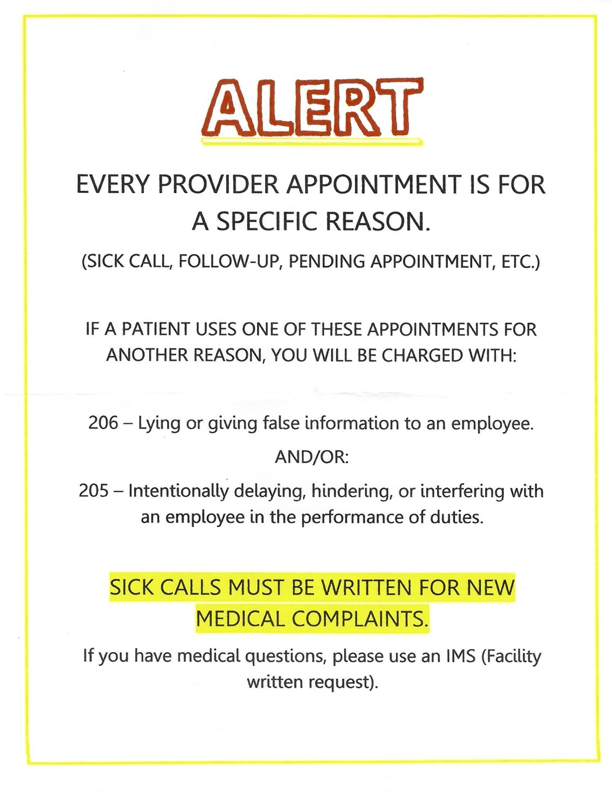Virginia Prison Still Failing to Provide Adequate Health Care, Incarcerated Women Say
Fluvanna Correctional Center patients say they’ve been threatened with disciplinary action for asking about symptoms at medical appointments.

Women at the Fluvanna Correctional Center for Women in Troy, Virginia, say healthcare at the prison is dangerously inadequate. A decade ago, attorneys filed a class action lawsuit that alleged the prison’s healthcare system violates the Eighth Amendment’s constitutional prohibition against cruel and unusual punishment. Even though the suit was settled in 2016 on the condition that prison officials deliver on a number of reforms, prisoners say they still struggle to access medical care.
Virginia prison officials are not compliant in two of 14 assessment areas and only partially compliant in another four assessment areas, according to the court-appointed monitor’s most recent report, filed in June. The department has challenged the monitor’s findings in court filings and in statements to The Appeal.
“The end of this case is really, ultimately, in Virginia’s hands,” said Deborah Golden, one of the attorneys representing the women at Fluvanna Correctional Center for Women (FCCW.) “They just have to comply with what they agreed to do.”
Although jail and prison officials are constitutionally obligated to provide adequate medical care to incarcerated people under the landmark 1976 Supreme Court decision Estelle v. Gamble, medical neglect in jails and prisons is pervasive. Inadequate care sometimes has fatal consequences. While most abuses are hidden from public or judicial scrutiny, the lawsuit and ongoing court monitoring reports give the public a uniquely close glimpse at the state of American prison healthcare. And as the monitor’s findings and recent statements from women at FCCW suggest, even independent oversight can be ill-equipped to quickly overhaul a prison’s healthcare system.
The lawsuit is not just about the women at FCCW, said Shebri Dillon, who is incarcerated in the prison. It’s also about protecting the lives of prisoners throughout the country who are often seen and treated as less than human.
“This place can be cruel and cold and callous, and not at the hands of the ones stuck here, but the ones who come in here to work,” Dillon wrote to The Appeal in a message sent through the prison’s electronic messaging service. “It is our responsibility to say something.”
In a June report, the court-appointed monitor found that VADOC had not yet made a number of promised changes to its health care services. As part of his investigation, the monitor spoke with 12 women incarcerated at the prison.
Four reported that when they used the call button in their cells, security staff was delayed in responding or did not respond at all. Two women said that they or a cellmate had to urinate or defecate in bags when no one responded, because most cells at the prison do not have toilets. Five women reported they’d been given the wrong medication and were given the proper medication after they pointed out the error to the nurse.
In declarations to the court submitted by attorneys for plaintiffs in the class action suit, women at FCCW say medical providers treat them with hostility, belittle their symptoms, and delay necessary care. Women at the prison say a punitive and hostile culture permeates medical services at FCCW.
In February, flyers appeared in the infirmary warning patients that if they raised issues other than what the appointment was scheduled for, they’d be charged with “lying or giving false information to an employee and/or intentionally delaying, hindering, or interfering with an employee in the performance of duties.”
Punishments for these violations can be severe, resulting in confinement to one’s cell for up to 30 days; losing access to commissary or phone privileges for up to 60 days; or losing up to 180 days of time earned off of one’s sentence (known as good time credit.)
The monitor’s report stated that the policy “seeks to punish patients” for getting routine medical care.

In a declaration to the court, Joyce Reynolds, who is incarcerated at FCCW, said that during a March medical visit with a nurse about her blood pressure and diabetes, she told the nurse she was having pain in her hands and legs. Reynolds thought it could be related to her diabetes. The nurse told her she could not talk about things not written on her sick call and if she did it again, she’d get a disciplinary charge.
In another incident, Reynolds described seeing a spine specialist outside the prison, who asked Reynolds to squeeze his hands and say if she had any pain. When she said she did, he referred her to a hand specialist. At a follow-up appointment at the prison,the nurse who’d given her the prior warning “was upset that I had been referred to the hand specialist,” Reynolds said. The nurse told her “not to bring up anything other than the stated reason for my appointment at outside appointments as well.”
“She told me that I am supposed to say no when asked by the doctor if I had any pain other than the one I’m there for,” said Reynolds in her declaration to the court.
VADOC spokesperson Benjamin Jarvela wrote to The Appeal in an email that, “Overall, there is little, if anything, in Ms. Reynolds’ records that corroborate any of her allegations. Without a HIPAA release from this patient, however, we cannot comment further.”
Jarvela denied anyone would be threatened with disciplinary action for raising legitimate medical questions.
“These critics will no doubt portray this flyer, which was nothing more than a well-intended reminder of long-standing policies, as an attempt to punish inmates for seeking healthcare,” Jarvela wrote in an email to The Appeal. “What it actually says is that requests for health care services should be legitimate.”
The notices were posted as part of a pilot program “to protect the clinic, staff, and patients from overutilization,” according to Jarvela. He said that one person was written up as a result of the program, but the security staff chose not to process the charge.
“This flyer had no demonstrable impact on the number of sick calls and there was no change in the behavior of those who were misrepresenting their conditions, so the pilot was written off as a failed attempt and the flyers were removed,” he wrote to The Appeal.
Jarvela contested the veracity of several of the declarations—“the sheer volume of false narratives here is troubling,” he wrote to The Appeal—and challenged their legitimacy because they were not signed in person. The women said they were unable to sign the declarations because of visiting restrictions due to COVID-19. However, Jarvela notes, visitation was open at the time the declarations were taken.
VADOC has defended the quality of the care they provide. Last year, the prison had far fewer deaths—three—than many other prisons in the state and there have been zero COVID-19 fatalities since the start of the pandemic.
The department has claimed that the new monitor, who was appointed in 2020—Homer Venters, former Chief Medical Officer of the NYC Correctional Health Services—is using different metrics for compliance than the former monitor. Based on the former monitor’s metrics, “FCCW continues to achieve compliance in each area of the Settlement Agreement,” Jarvela wrote to The Appeal. “The Department will continue to work with the new monitor and these changed standards.”
Still, women at FCCW say problems persist when seeking care in the prison—and when they go see specialists outside the prison.
An imprisoned woman named Rashanda Walker says she began radiation treatment for breast cancer in February 2022. On one occasion, she was shackled for three hours as she waited for her treatment, according to her declaration to the court. While she waited in a van outside the hospital, she was not allowed to use the bathroom or eat, even though she hadn’t had breakfast.
Jarvela told The Appeal in an email that, “For security reasons, our exact processes for transportation of inmates are not made public,” but noted that the settlement agreement allows the use of handcuffs when transporting incarcerated patients to outside medical appointments.
After finding the wait unbearable, Walker says she asked the officers to take her back to the prison. She was charged a $5 copay for missing the appointment. In 2020, prison officials eliminated copays for in-house providers, but incarcerated people may be charged for an outside consultation if they refuse to attend the appointment, according to Jarvela. The court-appointed monitor has found that the department was in compliance with the co-pay policy outlined in the settlement agreement.
Walker also says she was supposed to apply Aquaphor to her skin before her radiation treatments, but the prison didn’t fill her prescription until she was three or four weeks into her treatments. By then, she had already developed radiation burns, which became infected, leading her to be admitted to the infirmary for a week, according to her statement.
The infirmary was filthy, Walker said. The showers had not been cleaned and there was blood and food on the floor. While in the infirmary, she says she often had to change her own bandages. In the most recent monitor’s report, Venters wrote that several women had told him “there have been intermittent but repeated instances in which only one nurse is working in the infirmary.”
In response to The Appeal’s request for comment on Walker’s allegations, Jarvela wrote: “VADOC does contest these allegations and would like to offer further comment. However, because the plaintiffs have refused our requests to provide releases to discuss their medical care with you, we are not permitted to comment further. It is unfortunate, disappointing, and sad that plaintiffs and their attorneys are deliberately obstructing us from discussing the truth regarding these matters.”
Dillon, who’s incarcerated at FCCW, told The Appeal in a phone call that the experience of going to outside medical appointments is “dehumanizing.” She said she’s strip-searched before she leaves for outside appointments, and when she returns, ”You are made to squat, cough, spread, move things around.” During trips to appointments, Dillon said her wrists are chained to her waist and her ankles are shackled together.”
At doctor’s appointments, the chains only come off if the provider requests it, Dillon said. The shackles remain on even when they go to the bathroom—if an officer permits them to—the shackles remain on, she said. When asked to respond to these allegations, Jarvela reiterated that they cannot discuss these security procedures.
“Usually somebody will go in [the bathroom] with you,” Dillon said. “So you get to urinate while somebody holds on to your chains.”
